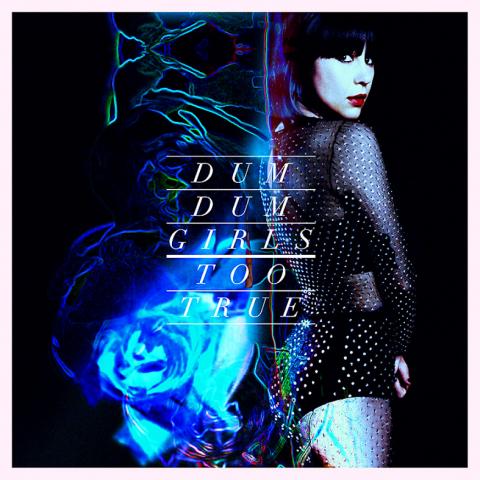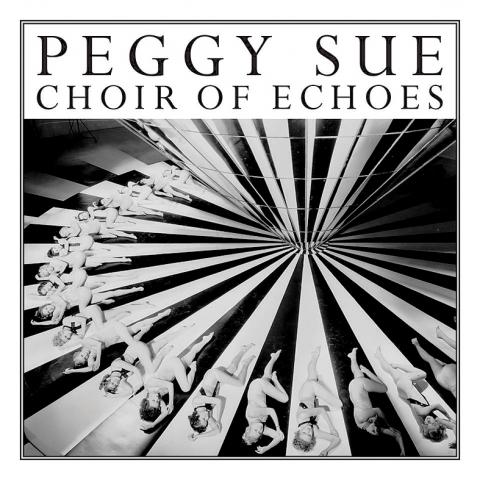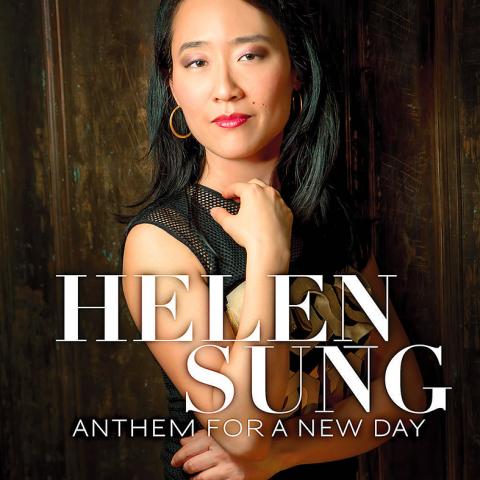Too True, by Dum Dum Girls
Dum Dum Girls, based in New York, and Peggy Sue, a British band, started in different realms: punky for Dum Dum Girls, folky for Peggy Sue. But there are moments on their two new albums when they are making nearly the same music, with women’s voices, a galloping beat and a guitar swathed in reverb.
Dum Dum Girls found that sound first. The group — which is now, in its studio lineup, just songwriter, singer and guitarist Dee Dee, abetted by guitarist, drummer and programmer Sune Rose Wagner, from the Raveonettes — arrived in 2008 with a concept so fully formed that, as with the Ramones, each successive album has largely offered refinements and variations.

“There’s no particular place we are going/Still we are going,” Dee Dee sings in Lost Boys and Girls Club on the new Dum Dum Girls album, Too True.
Dum Dum Girls continue to explore a sonic and formal intersection of the early 1960s — girl groups, surf-rock, garage-rock — and the post-punk 1980s of the Jesus and Mary Chain and My Bloody Valentine. A few chords, a clear melody and succinct verse-chorus-bridge structures are filled with darkly allusive lyrics and floated amid gauzy, sweeping guitar effects.
It’s a roomy concept, encompassing spaghetti Western guitar touches in Cult of Love, new wave momentum in Little Minx, stately folk-rock in Under These Hands, a weighty undertow in Lost Boys and Girls Club and a celestial serenity in Trouble Is My Name. As the titles suggest, Dee Dee’s lyrics glimpse loss, betrayal, loneliness and death, but she sings them calmly, in productions so finely burnished that the sound washes away the sadness.

Peggy Sue is a newer convert to the glories of reverb. The group is a trio, with Rosa Slade and Katy Young on vocals and guitars, and Olly Joyce on drums, and its songs can sound simultaneously old and new. The guitar-picking patterns and stark, open vocal harmonies have Celtic roots; the beat, the words and the way songs gather more intertwined parts as they go mark them as rock. Peggy Sue has grown more plugged in with each album, and Choir of Echoes revels in electric guitar tones, using reverb to add spookier depths. Substitute, with a tom-tom beat, a tambourine, a repetitive two-chord riff and the squeak of fingers on reverbed guitar strings, could be a rawer early Dum Dum Girls song.
The lyrics are full of love gone wrong: regrets, misunderstandings, reconciliations and more regrets. “I forget all the errors of your ways,” the women sing, “But I remember now.” Guitars intertwine and gather around them, in ever-thickening skeins of picking and strumming, pulling a listener into all the mesmerizing turbulence of those troubled romances.
— Jon Pareles, NY Times News Service

Anthem for a New Day, by Helen Sung
Jazz musicians do a lot of their growing up in public — it’s one consequence of a field in which talent shows up sooner than artistry — and the process usually follows a model of judicious refinement. But that’s not quite the case with Helen Sung, who trained as a classical pianist before turning to jazz, and has released a decade’s worth of crisp, conscientious and decorous albums. Anthem for a New Day is her major-label debut, and she has described it herself as a leap forward, the first full measure of her identity.
That’s a convenient selling point, but the music readily supports it. Clarity of purpose has never been a problem for Sung, whose previous albums include a bundle of themes inspired by Catalan composer Isaac Albeniz. And the quality of her touch, like her grasp of harmony and form, has never been in doubt. What’s striking this time around is an openness of vision, paired with a looseness of execution. Sung sounds both relaxed and searching, and she imparts the same qualities to her crew.
Those players represent a contemporary index of post-bop accomplishment. Her front line features Seamus Blake on tenor and soprano saxophone and Ingrid Jensen on trumpet; her rhythm section has bassist Reuben Rogers, drummer Obed Calvaire and percussionist Samuel Torres. Among the special guests are violinist Regina Carter and clarinetist Paquito D’Rivera.
Sung has neatly finessed her share of jazz standards, so it’s instructive to hear the liberties she takes with Thelonious Monk’s Epistrophy and Duke Ellington’s It Don’t Mean a Thing (if It Ain’t Got That Swing), bringing an elasticity and swagger to both. (She’s more faithful, to a fault, with the Chick Corea tune Armando’s Rhumba.)
Her originals deliver on a promise of buoyant lyricism (Hope Springs Eternally), scrambling intensity (Chaos Theory) and brisk textural intrigue (Hidden and the title track). Brother Thelonious — commissioned by North Coast Brewing Co, which has a Belgian-style ale by that name — suggests a Monkish idyll as envisioned by Art Blakey’s Jazz Messengers, sometime in the 1980s.
Sung plays some of these on a Fender Rhodes, which brings a softer dimension to her sound. But she’s alone at an acoustic piano on Equipoise, a Stanley Cowell composition that closes the album on a note of muted reflection. Her reading of the piece glows with subtlety: She makes it feel like the serenest sort of mission statement.
— Nate Chinen, NY Times News Service

The Taipei Times last week reported that the rising share of seniors in the population is reshaping the nation’s housing markets. According to data from the Ministry of the Interior, about 850,000 residences were occupied by elderly people in the first quarter, including 655,000 that housed only one resident. H&B Realty chief researcher Jessica Hsu (徐佳馨), quoted in the article, said that there is rising demand for elderly-friendly housing, including units with elevators, barrier-free layouts and proximity to healthcare services. Hsu and others cited in the article highlighted the changing family residential dynamics, as children no longer live with parents,

The classic warmth of a good old-fashioned izakaya beckons you in, all cozy nooks and dark wood finishes, as tables order a third round and waiters sling tapas-sized bites and assorted — sometimes unidentifiable — skewered meats. But there’s a romantic hush about this Ximending (西門町) hotspot, with cocktails savored, plating elegant and never rushed and daters and diners lit by candlelight and chandelier. Each chair is mismatched and the assorted tables appear to be the fanciest picks from a nearby flea market. A naked sewing mannequin stands in a dimly lit corner, adorned with antique mirrors and draped foliage

The election of Cheng Li-wun (鄭麗文) as chair of the Chinese Nationalist Party (KMT) marked a triumphant return of pride in the “Chinese” in the party name. Cheng wants Taiwanese to be proud to call themselves Chinese again. The unambiguous winner was a return to the KMT ideology that formed in the early 2000s under then chairman Lien Chan (連戰) and president Ma Ying-jeou (馬英九) put into practice as far as he could, until ultimately thwarted by hundreds of thousands of protestors thronging the streets in what became known as the Sunflower movement in 2014. Cheng is an unambiguous Chinese ethnonationalist,

I was 10 when I read an article in the local paper about the Air Guitar World Championships, which take place every year in my home town of Oulu, Finland. My parents had helped out at the very first contest back in 1996 — my mum gave out fliers, my dad sorted the music. Since then, national championships have been held all across the world, with the winners assembling in Oulu every summer. At the time, I asked my parents if I could compete. At first they were hesitant; the event was in a bar, and there would be a lot